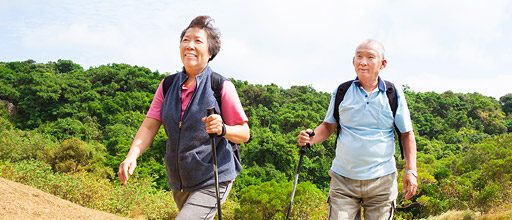
Laws that could make you younger
As I move towards 50, I think more about my age than I used to. And it’s not entirely encouraging.I hurtle around the sun, clock up the years and head unswervingly towards the inevitable. Or do I?
World Health Day celebrates the establishment of the World Health Organisation in 1948. This year the theme was health and ageing - two things that don’t obviously go together – but two things that now warrant much more of my attention than they used to!
Twenty-five years ago when I first started in medicine I learned that there were two types of age. Chronological age that described the number of solar orbits you had made, and biological age, defined by what you looked like from the outside or what the lab reports said about your insides. At the time, concepts important for my patients, but not for me.
Now, with nearly two decades of research under my belt and 25 revolutions added to my life, the importance of this distinction has become sharper. As it turns out, I needn’t commence the downward spiral right now, because it’s biological age that really matters and biological age is something that can be modified.
Getting our heads around the idea that we can control our age has enormous implications for the world’s ageing population. If we can shake the fatalism that accompanies each birthday and engage in action, we can have a real impact upon our health and longevity.
So, what can we do to slow the clock?
Well, it’s actually pretty clear – don’t smoke, don’t get fat, don’t drink too much, take plenty of exercise and eat lots of fresh fruit and vegetables.
The problem of course is that you’ve heard this all before and it’s much easier said than done.
We have to frame this as something other than a call upon the individual to do the right thing. Because while more self-discipline and more self-control, will turn back the clock for a motivated few, it doesn’t work for most. The habits of a lifetime are hard to break however great the incentive. Heart attack survivors continue to smoke, diabetics remain overweight and only a few take all the medicines they are prescribed.
To succeed in slowing the ageing process most of us are going to need help. In an environment that bombards us with adverts for junk food, alcohol and fast cars we are seduced into a lifetime of gluttony and sloth. Our waistlines expand and there is a real possibility that life expectances will soon start to decline. We need the help of Government.
And amongst the gloom there are beacons of hope.
In many countries around the world, we no longer have cigarettes advertised to us and in several more we can now see the energy content of fast foods on menu boards. The UK has put a minimum price on alcohol and Denmark is taxing fat. Small steps in the right direction. But not the great step that mankind needs.
Unfortunately this isn’t going to happen through good will. There’s just too much money at stake and too many vested interests that Governments around the world are going to have to stop and regulate. Mandatory, front-of-pack labelling systems, restrictions on the levels of salt and fat in processed foods and an expansion of controls on the sale of alcohol.
In a world like that we could really turn back the clock.
And the next time you have a birthday perhaps you can relax a bit - because it’s not how many times you’ve circled the sun that matters, it’s what you were doing while you went around that makes the difference.

